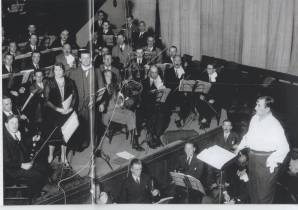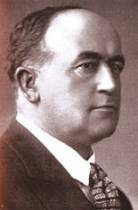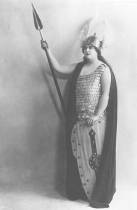
Albert Coates (April 23, 1882 – December 11, 1953) was an Anglo-Russian conductor and composer.

Robert Radford (13 May 1874, Nottingham – 3 March 1933, London) was a British bass singer who made his career entirely in Britain, becoming one of the foremost singers of oratorio and concert work and equally having great success in a wide range of operatic roles from Wagner to Gilbert and Sullivan. Even as a very young man Radford had a deep and resonant voice. He studied at the Royal Academy of Music in London, mainly under the conductor Alberto Randegger, but also received lessons from Battison Haynes and Frederick King. He had natural dramatic gifts which from the outset suggested an operatic career, but his early professional life was devoted particularly to oratorio and the concert platform. Robert Radford made his operatic debut at Covent Garden in London in 1904 as the Commendatore in Don Giovanni. In 1908 he sang Hagen and Hunding in the first English Ring Cycle under Hans Richter in London. He created Abbott Tunstall in Angelus (Naylor). In 1921 he became a founder, with Thomas Beecham, of the British National Opera Company. Later he became its director. In 1920-22 he became a founder Director of the British National Opera Company, and also became an important member of its singing company. He sang in two Philharmonic Society performances of Beethoven's 9th Symphony, first under Felix Weingartner in March 1924 with Florence Austral, Margaret Balfour and Frank Titterton, and again in October 1925 with Dorothy Silk, Muriel Brunskill and Walter Widdop, under Albert Coates. He continued to make recordings for HMV after the advent of the electric microphone in 1925. In late acoustic and early electric sets of Wagnerian passages, he is heard at some length (often opposite Florence Austral) as Alberich in Das Rheingold, Wotan in Die Walküre, and Hagen in Götterdämmerung, as Gurnemanz in Parsifal (HMV D 1025-29) and as both Hans Sachs and Pogner in Die Meistersinger, all under the baton of Albert Coates: the recorded sound is mostly disappointing. In 1929 Robert Radford was appointed to the faculty of his alma mater. His fame as an opera singer was great in England. In addition to singing opera, he greatly distinguished himself as a concert artist. His daughter, Winifred Radford (1901-1993), who had studied with him, became a singer and teacher. She was closely associated with Pierre Bernac and Francis Poulenc.

Florence Austral (26 April 1892 – 15 May 1968) was an Australian operatic soprano renowned for her interpretation of Wagnerian roles, although she never appeared at Bayreuth. She was born Florence Mary Wilson, but adopted the professional surname Austral in 1921 in honour of her homeland Australia. She was considered to have few equals in sheer vocal quality until the arrival of Kirsten Flagstad. Acting was not her strong point and her characterisations were mainly achieved with the voice, which made her recordings so enjoyable. She, Germaine Lubin and Frida Leider were considered to be the great Wagnerian dramatic sopranos of their era, together with Flagstad, who did not rise to international fame until the 1930s. (Among post-War Wagnerian sopranos, only Birgit Nilsson and, to a lesser extent, Astrid Varnay, have been in their exalted league.) Austral was born in Richmond, Victoria as Florence Mary Wilson, the daughter of a Swedish carpenter formerly known as Wilhelm Lindholm, and his wife Helena Mary, née Harris, a dressmaker. Her father died in 1895 and her mother set up in business; in 1903 she married again, to a 28-year-old Syrian book-keeper John Fawaz, and Florence took the name Florence Fawaz. She was discovered by the choir master Edward Sugden. In 1914 she won first prizes in both the soprano and mezzo categories at a singing contest in Ballarat, obtaining a scholarship which enabled her to continue her studies with Elise Wiedermann. She went to New York in 1919 to study with Gabriele Sibella. She was offered a contract to sing at the Metropolitan Opera but declined it in order to pursue a career in Britain. She went to London where she was promoted by Robert Radford. She made her Covent Garden debut on 16 May 1922 as Brünnhilde in Wagner's Die Walküre, and later in the same role in Siegfried. She shared this role with Frida Leider, who received greater acclaim due to her superior acting skills. Austral's other roles at Covent Garden included Isolde and the title role in Verdi's Aida. In 1923 she appeared with Dame Nellie Melba, who called her "One of the wonder voices of the world". Unfortunately for her career, she sang more with the British National Opera Company than at Covent Garden in the 1920s. She would have sung more often at Covent Garden, but Bruno Walter did not care for her voice and he was reluctant to engage her. In the mid-1920s she made the first of more than 100 recordings for HMV, which are still treasured. Fred Gaisberg said: "In the early twenties Florence Austral was the most important recording artist we had, thanks to the beauty, power and compass of her voice". She recorded opera arias as well as songs, oratorios and sang in superb duets opposite Feodor Chaliapin, Miguel Fleta, Tudor Davies and Walter Widdop. Her many admirable recordings for HMV include the pioneer late-acoustic English-language series of excerpts from The Ring. In 1925 Florence Austral became the second wife of the Australian flautist John Amadio, and they toured widely together in America, Europe and Australia. She often sang in the Ring operas in Philadelphia, and in concert under the conductor Fritz Reiner. However, she never appeared at Bayreuth or in Vienna. She was negotiating to sing in Vienna, but this did not eventuate. In 1930 she became a principal singer with the Berlin State Opera. It was there in that same year that she showed the first signs of multiple sclerosis, during a performance of Die Walküre opposite Friedrich Schorr. Her opera career gradually suffered as a result of this advancing debilitating disease, but she was still able to devote herself to concert and recital work, developing a large lieder repertoire, although she also sang operatic excerpts. Her appearances in opera during this time included ones in her home country Australia. She returned to Britain in 1939, and appeared in many benefit concerts during the early part of World War II, before her illness forced her to retire in 1940. In 1946 she returned to Australia, by now almost completely paralysed with multiple sclerosis. However, interest in her recordings had declined and she was in need of an income, so she taught singing at the Newcastle Conservatorium (now part of the University of Newcastle, Australia) from 1954 until her retirement in 1959. Florence Austral died of cerebrovascular disease in a church home for the aged at Mayfield, Newcastle, on 15 May 1968. By general critical consent, she remains the finest dramatic soprano produced by Australia.

Tudor Davies (12 November 1892 – 2 April 1958) was a Welsh tenor. Tudor Davies was born in Cymmer, near Porth, South Wales, on 12 November 1892. He studied in Cardiff and at the Royal College of Music in London. He served as an engineer in the Royal Navy during World War I. He toured the United States, Canada and Australia (where he shared the stage with Maggie Teyte) and then returned to England, where he sang with the British National Opera Company, Sadler's Wells Opera and the Carl Rosa Opera Company. He sang Rodolfo to Dame Nellie Melba's Mimi in La bohème in 1922 at Covent Garden. He sang a number of leading tenor parts from the Italian, French and German repertoire, such as Lohengrin, Tamino, Florestan, Faust, Don José and the Duke of Mantua. He also appeared in English operas such as Dame Ethel Smyth's Fête Galante, and Arthur Benjamin's The Devil Take Her. He created the title role in Ralph Vaughan Williams' opera Hugh the Drover in 1924, excerpts from which he also recorded. (In 1928, he also sang in the United States premiere of the opera, with the Washington National Opera.) He created Prince Hal in Gustav Holst's At the Boar's Head in 1925. He sang the the title role in Giuseppe Verdi's Don Carlos in the opera's first performance in England in 1938, and he appeared in the first Sadler's Wells performance of Nikolai Rimsky-Korsakov's The Snow Maiden. In his later career he was mainly a concert singer, and teacher in Cardiff. Tudor Davies made a number of recordings, including a complete performance of Giacomo Puccini's Madama Butterfly, as well as excerpts from Richard Wagner's Der Ring des Nibelungen and The Mastersingers of Nuremberg. He recorded the Love Duet from Siegfried with Florence Austral. He married the soprano Ruth Packer, whom he met while working for ENSA in World War II. He died on 2 April 1958 in Penault, Monmouthshire, after surgery for a liver condition.

Edith Furmedge, mezzo-soprano (27 March 1898, London, - 09 October 1956 London); she was a Londoner, and was orginally intended
for the scholastic profession, but when she left Cambridge Music soon claimed
her, and before long she was studying singing with the famous baritione Dinh
Gilly, whom she subsequently married. Apart from her fame as Wagnerian singer
(the productions of Wagner's operas at Covent Garden during the periond between
1924 and 1939 will not readily forget the richness and the authority of Edith
Furmedge's singing in such roles as Erda and Fricka), she was a well-known
figure at all the musical festivals in England, appearing with such famous
conductors as Sir Thomas Beecham, Sir Henry Wood, Bruno Walter, Furtwängler,
Albert Coates, and many others. She was also a prominent member of the british
National Opera Company, which did pioneer work for British Opera in the 1920s.
Her public was greatly increased with the coming of broadcasting, and her impressive
voice and majestic sense of style came over particularly well on the air. Edith
Furmedge was also well known as teacher of her art, carrying on after her
husband's death the school of singing which he founded. There are many today
who deeply regret the loss of one whose guiding hand they will sorely miss. Her
friends remember her as a person who distilled about her a most refreshing
sense of calm. No one was ever less like the proverbially 'temperamental'
singer than Edith Furmedge, but that does not mean that her work as an artist
was ever lacking in fire, where the music called for it. In another way, too,
she was the reserve of the usual self-centred artist. She never talked about
herself - she would hear her friends tell their troubles, and discuss their
ambitions, but she herself never seemed to need the outlet of a good grumble,
and one might have thought she was not interested at all in her own career. An
example of this neglect of herself was given to me by another singer, Gladys
Parr, who said that Edith's press cuttings and the programmes of her career
always seemed to be in the most dreadful muddle - old bits of newspaper pushed
away into corners, with nothing organized or properly set out. But one day Miss
Parr happend upon a beautifully tidy account of the career of Dinh Gilly,
carrefully pasted into books by his wife, who could not find the time to
perform the same service for herself. That is the kind of Edith Furmedge was.
She will be greatly missed in the musical world, but her friends and her pupils
will miss her most of all.
О колоратурном сопрано Бесси Джонс удалось найти только некролог 1975 года: BESSIE JONES. We learn with deep regret of the death of Bessie Jones at the age of 87, in Barry, South Wales, where she had lived for some years. She was in many of the first complete recordings of Gilbert & Sullivan, and sang the principal soprano role in the first recording of Merrie England, having been specially chosen by Sir Edward German. She made a great many records for H.M.V., mainly in the acoustic period, and gave many stage performances in Opera. One of her most treasured memories was the night she stood in during a performance of Aida at Covent Garden in which Caruso was singing Radames. Richard Ault and I visited her about two years ago and found her to be a charming old lady. A tape-recording exists of that afternoon's meeting. I feel this will prove to be an important historical document.
Wagner: Der Ring Des Nibelungen (excerpts)
1. Alberich steals the Gold (Robert Radford) (rec.: 18.12.1922) 2. Descent in Nibelheim (Robert Radford, Edith Furmedge) (rec.: 18.12.1922) 3. Prelude to Act I of 'Die Walkure' (rec.: 28.06.1922) 4. Brunhilde's battle-cry (Florence Austral, Robert Radford) (rec.: 8.12.1922) 5. Brunhilde foretells Siegmund's death (Florence Austral, Tudor Davies) (rec.: 18.12.1922) 6. Ride of Walkure (rec.: 17.07.1922) 7. Brunhilde gives Sieglind the broken sword (Florence Austral, Edith Furmedge) (rec.: 8.12.1922) 8. Siegfried forget the sword (Tudor Davies) (rec.: 30.06.1922) 9. Siegfried follows the Wood-Bird (Tudor Davies, Bessie Jones) (rec.: 26.04.1923) 10. Final duet 'Siegfried' (Tudor Davies, Florence Austral) (rec.: 19.12.1922 & 26.04.1923) 11. Parting of Siegfried and Brunhilde (Tudor Davies, Florence Austral) (rec.: 19.12.1922) 12. Gunther and Gutrune welcome Siegfried (Tudor Davies, Robert Radford, Bessie Jones) (rec.: 26.04.1923) 13. Immolation scene (Florence Austral) (rec.: 22.12.1922) Symphony Orchestra
Conductor: Albert Coates
|

